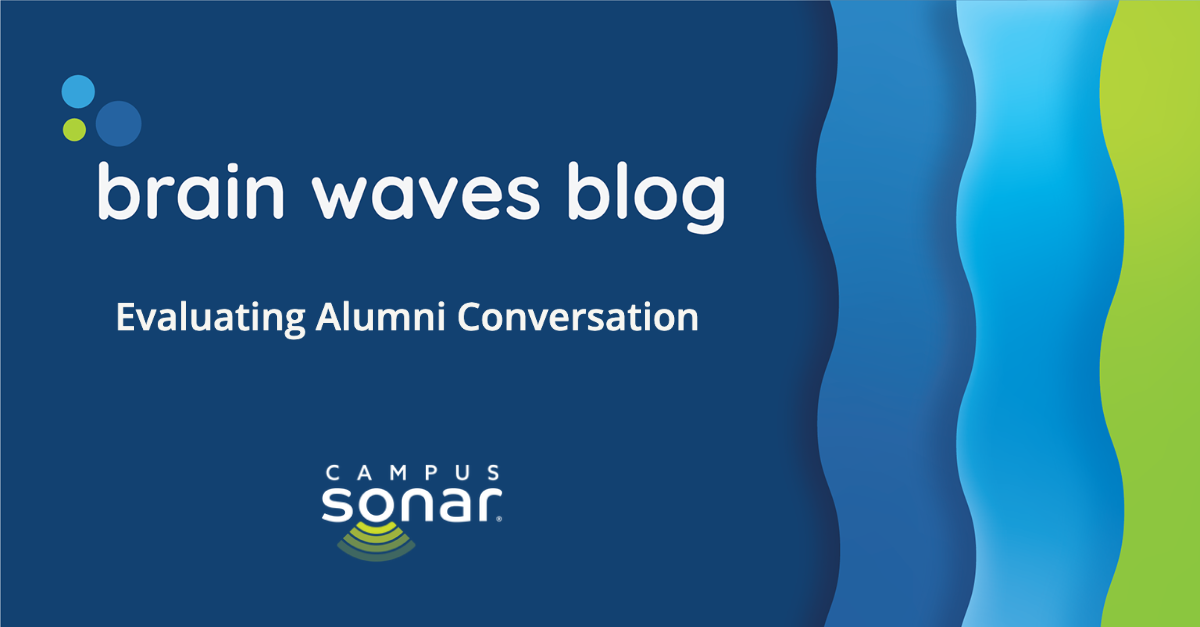Evaluating Alumni Conversation

As higher ed insiders, we have a vested interest in understanding the individual and collective beliefs, attitudes, and relationships that alumni have with their alma maters. This knowledge provides valuable insight into their future actions and behaviors. As social media data analysts, we decided to conduct social listening analysis of alumni conversations to evaluate how they discuss their alma maters across various social platforms. We examined alumni conversation as a whole, then used multiple ways to segment the conversation to see how different characteristics revealed distinct types of conversation among alumni.
This post focuses on an overview of the data and several key findings. Examining how alumni discuss their relationship to your institution provides you with insight into the moments that bring the most pride, pain, and potential influence, as well as how active they are in-person and across the social space.
Analyzing the Conversation
Methodology
We examined three years of mentions from the beginning of July 2016 through the end of June 2019, using a one percent sample of the total conversation volume. This gave us approximately 120,000 mentions to analyze and segment. We focused on Twitter, news, and forum mentions (which includes Reddit), and segmented the data to examine how alumni differ based on:
- The region of the country they live in.
- The type of degree they earned.
- How recently they graduated.
- If they talk about being an alumni themselves.
- If they talk about a friend or family member who is an alum.
- If they generally mention being an alumni without mentioning a particular institution.
Where and When Alumni Talk
Our analysis found that 55 percent of the total mentions were from mentions of alumni in the news. Twenty-nine percent of the mentions were from Twitter and 16 percent were from forums. Somewhat predictably, mention volume peaked in May every year, when most graduations occur and new alumni are welcomed and celebrated.
What Alumni Think and Feel
To better understand the alumni mindset, we analyzed sentiment and found that 18 percent of the mentions were positive, 61 percent were neutral, and 21 percent were negative. Popular positive mentions were about graduations and negative mentions were about student loans and politics. Student loan mentions had the most negative sentiment with 46 percent negative mentions, 43 percent neutral, and 11 percent positive.
Understanding the topics and events that skew positive or negative gives campuses the opportunity to highlight success stories and other celebratory moments to remind alumni of their positive experiences on campus and a nudge to extend that joy for current and future students and even themselves.

What Else Can We Learn?
When examining the online conversations from alumni, mentions of being an alumnus/a of a particular institution accounted for 81 percent, general discussion of alumni made up 18 percent of mentions, and mentions of a friend or family member alumnus/a was 1 percent of mentions.
Since personal mentions account for the vast majority of these conversations, they provide insight into how alumni personally feel. Advancement departments can use these as an indicator of the values, thoughts, and behaviors of their own alumni.
Understanding the authentic beliefs of individuals and groups of people is one of the main strengths of social listening compared to other research methods. When used properly, these individual conversations and collective patterns can help build relationships with alumni and better understand how they perceive their relationship with your institution, which can (and should) influence the way you communicate with them.
Taking a further look into conversation segments will provide more detail about how different alumni segments think, feel, and behave based on varying factors that influence their worldview. Better understanding your alumni allows them to feel more connected to their institution, which creates a more loyal and long-lasting relationship in the long run.

